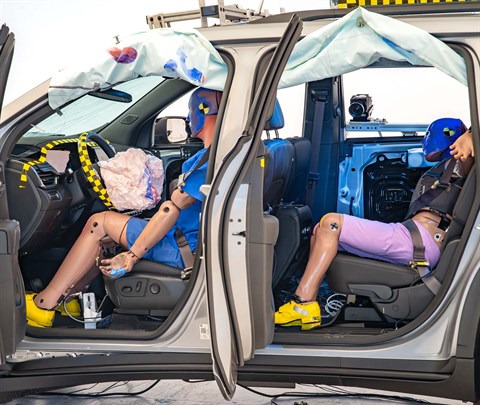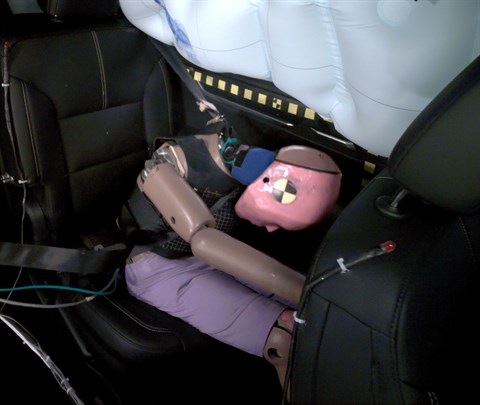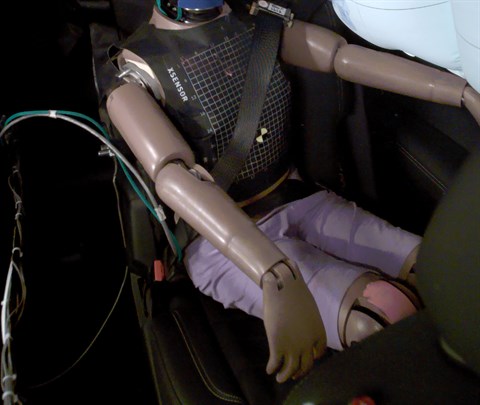Small overlap front
The small overlap front evaluation consists of a driver-side and a passenger-side component. If the results of the two evaluations differ, then the combined small overlap rating is equal to the lower rating.
Driver-side
- Rating applies to 2024-25 models
Tested vehicle: 2024 Chevrolet Traverse Premiere 4-door 4wd
The Chevrolet Traverse was redesigned for the 2024 model year. Driver-side small overlap front ratings are assigned by the Institute based on a test of a 2024 Traverse conducted by General Motors. These ratings also apply to the GMC Acadia.
| Evaluation criteria | Rating |
|---|---|
| Overall driver-side evaluation | |
| Structure and safety cage | |
| Driver injury measures | |
| Head/neck | |
| Chest | |
| Hip/thigh | |
| Lower leg/foot | |
| Driver restraints and dummy kinematics | |
Passenger-side
- Rating applies to 2024-25 models
Tested vehicle: 2024 Chevrolet Traverse Premiere 4-door 4wd
The Chevrolet Traverse was redesigned for the 2024 model year. Passenger-side small overlap front ratings are assigned by the Institute based on a test of a 2024 Traverse conducted by General Motors. These ratings also apply to the GMC Acadia.
| Evaluation criteria | Rating |
|---|---|
| Overall passenger-side evaluation | |
| Structure and safety cage | |
| Passenger injury measures | |
| Head/neck | |
| Chest | |
| Hip/thigh | |
| Lower leg/foot | |
| Passenger restraints and dummy kinematics | |
| Driver injury measures | |
| Head/neck | |
| Chest | |
| Hip/thigh | |
| Lower leg/foot | |
| Driver restraints and dummy kinematics | |
Moderate overlap front: updated test
Rating applies to 2024-25 models
Tested vehicle: 2024 GMC Acadia Elevation 4-door 4wd
The GMC Acadia was redesigned for the 2024 model year. These ratings do not apply to the Chevrolet Traverse.
| Evaluation criteria | Rating |
|---|---|
| Overall evaluation | |
| Structure and safety cage | |
| Driver injury measures | |
| Head/neck | |
| Chest | |
| Thigh/hip | |
| Leg/foot | |
| Driver restraints and dummy kinematics | |
| Rear passenger injury measures | |
| Head/neck | |
| Chest | |
| Thigh | |
|
Rear passenger restraints and dummy kinematics
| |

View of the vehicle after the crash showing the airbags and damage to the occupant compartment.

The rear passenger dummy's head approached the front seatback, which increases the risk of head injuries.

Rear passenger dummy injury values indicate a low risk of injury to the head or neck and chest. During the crash, the shoulder belt remained in an ideal position on the dummy’s chest.

The rear passenger dummy's lap belt moved from the ideal position on the pelvis onto the abdomen, increasing the risk of abdominal injuries.
Side: updated test
Rating applies to 2024-25 models
Tested vehicle: 2024 GMC Acadia Uplevel 4-door 4wd
The GMC Acadia was redesigned for the 2024 model year. Side 2.0 ratings are assigned by the Institute based on a test of a 2024 Acadia conducted by General Motors. These ratings also apply to the Chevrolet Traverse and newly redesigned Buick Enclave.
| Evaluation criteria | Rating |
|---|---|
| Overall evaluation | |
| Structure and safety cage | |
| Driver injury measures | |
| Head/neck | |
| Torso | |
| Pelvis | |
| Driver head protection | |
| Rear passenger injury measures | |
| Head/neck | |
| Torso | |
| Pelvis | |
| Rear passenger head protection | |
Headlights
Ratings are given for 2 different headlight variations available on this vehicle.
Trim level(s)
- All trims; built after January 2025
| Evaluation criteria | Rating |
|---|---|
| Low-beam headlight type | LED projector |
| High-beam headlight type | LED projector |
| Curve-adaptive? | No |
| High-beam assist? | Yes |
|
Overall rating | |
| Distance at which headlights provide at least 5 lux illumination: | |
Low beams
On the straightaway, visibility was good on the left side of the road and fair on the right side. On curves, visibility was good on both right curves, fair on the sharp left curve and inadequate on the gradual left curve.
The low beams never exceeded glare limits.
High beams
On the straightaway, visibility was good on both sides of the road. On curves, visibility was good on the gradual left and gradual right curves and fair on the sharp left and sharp right curves.
High-beam assist compensates for some limitations of this vehicle's low beams on the straightaway, on both left curves and on the sharp right curve.
Trim level(s)
- All trims; built before February 2025
| Evaluation criteria | Rating |
|---|---|
| Low-beam headlight type | LED projector |
| High-beam headlight type | LED projector |
| Curve-adaptive? | No |
| High-beam assist? | Yes |
|
Overall rating | |
| Distance at which headlights provide at least 5 lux illumination: | |
Low beams
On the straightaway, visibility was good on both sides of the road. On curves, visibility was good in all 4 tests.
The low beams created some glare.
High beams
On the straightaway, visibility was good on both sides of the road. On curves, visibility was good on the gradual left and gradual right curves and fair on the sharp left and sharp right curves.
High-beam assist compensates for some limitations of this vehicle's low beams on the sharp left curve and on the sharp right curve.
Front crash prevention: vehicle-to-vehicle 2.0
Front crash prevention: pedestrian
Seat belt reminders
Rating applies to 2024-25 models
| Evaluation criteria | Rating |
|---|---|
| Overall evaluation | |
| Front row | |
| Unbelted occupant alert (audible & visual) | |
| Initiation time | |
| Duration | Long enough (90+ seconds) |
| Volume | |
| Audio frequency | |
| Second row | |
| Startup status alert (visual) | |
| Initiation time | |
| Duration at least 60 seconds | |
| Belt disengaged alert (audible & visual) | |
| Initiation time | |
| Duration at least 30 seconds | |
| Volume | |
| Audio frequency | |
